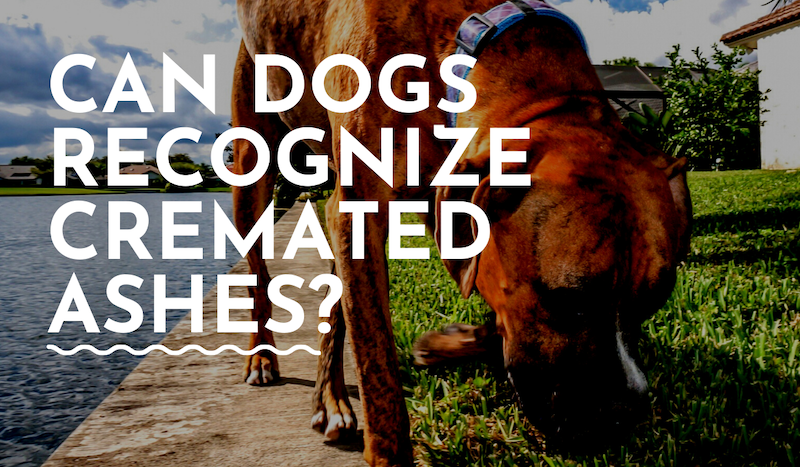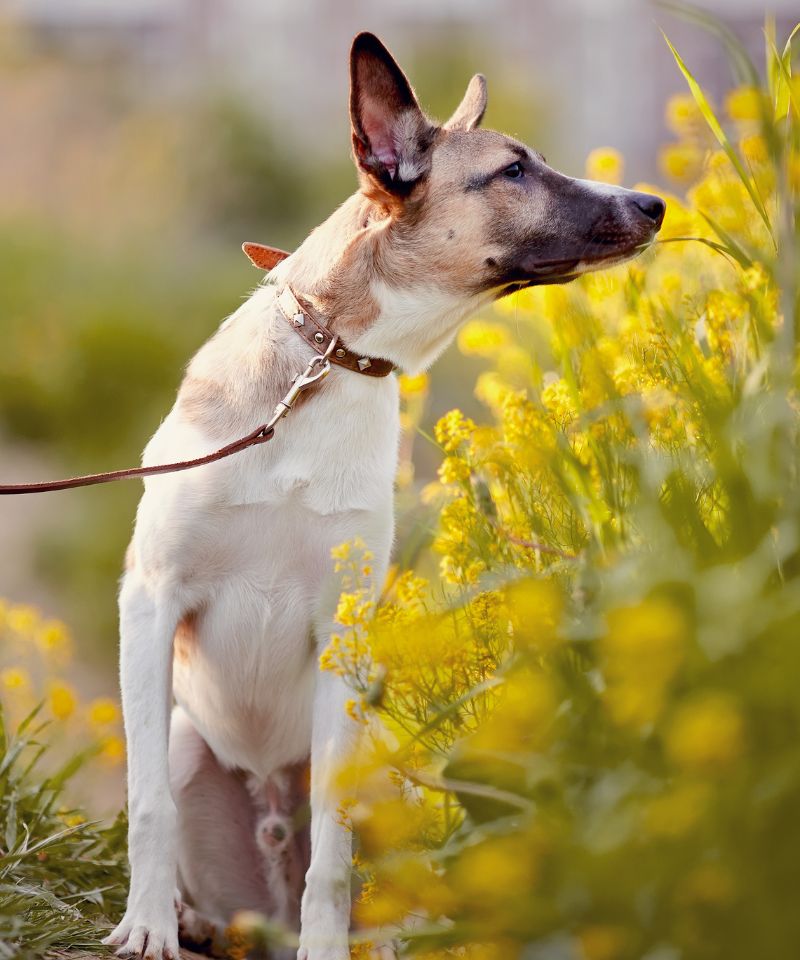Have you ever wondered if your dog can recognize the ashes of their departed companion or even your own ashes after you pass away?
It’s a common question among pet owners who have lost a furry companion or are planning for end-of-life arrangements.
According to experts, dogs can indeed recognize the scent of cremated ashes, including those of other dogs, due to their powerful sense of smell, supported by up to 300 million olfactory receptors in their noses.
However, while dogs can recognize the scent of cremated ashes, they won’t understand the concept of death or cremation; rather, they associate the smell with the individual or animal they knew in life.
Additionally, dogs may not always react to ashes in the way we may expect them to, and some may show no interest in the scent, while others may become very attached to the cremated remains.

A Dog’s Sense of Smell
A dog’s sense of smell is between 10,000 and 100,000 times as potent as humans.
This power comes from the up to 300 million olfactory receptors dogs have in their noses, compared to the mere 6 million humans have.
Dogs use their sense of smell to explore their environment, communicate with other dogs, and identify objects and people.
They can detect odors that are not perceptible to humans, such as the scent of a single drop of blood diluted in an Olympic-sized swimming pool.
Dogs can also differentiate between different scents, even those that are very similar.
For example, they can distinguish between the scent of two identical twins, even if they wear the same clothes and have the same diet.
Therefore, this extraordinary olfactory capability is harnessed in various fields, including search and rescue operations, detection of medical conditions like seizures or low blood sugar, and even identifying specific individuals.
Can Dogs Recognize Cremated Ashes?

Research suggests that dogs have the potential to recognize the scent of cremated remains, including those of other dogs, due to their powerful olfactory abilities.
Human cremains have a distinct odor that trained dogs can easily identify, even in a house completely destroyed by a wildfire that can reach temperatures around 800°C (1,500°F).
This capability is why dogs are often employed to locate missing persons and, in some cases, the burnt remains of individuals after a fire.
It’s important to note that not all dogs are trained to detect cremated remains; only specially trained dogs are used for this purpose.
These dogs undergo rigorous training to recognize the scent of human cremains and distinguish it from other odors.
On the other hand, some anecdotal evidence supports the notion that even untrained dogs may sometimes react to cremated ashes.
Many pet owners report that their dogs display behaviors indicating recognition or interest when near the ashes of a deceased companion.
However, scientific studies specifically examining this phenomenon are limited, making it challenging to draw definitive conclusions.
Additionally, while dogs may be able to recognize cremated remains and even react to them in a certain way, it’s unlikely that they can understand the concept of dying and cremation the way we can and that they are aware of the finality and emotional significance associated with these processes.
Can Dogs Smell Other Dog’s Ashes?
Some pet owners have reported that their dogs seem to recognize the scent of their departed companion and act in certain ways, either with excitement or by portraying signs of anxiety, such as being vocal when presented with their ashes.
However, any reaction might have more to do with your own signs of grief than anything else.
Dogs rely heavily on visual cues and body language to communicate, so if your dog was close to your recently deceased pet, they may be displaying signs of grief and confusion due to the absence of their companion rather than understanding the concept of what the ashes represent.
5 Factors That Affect Dogs’ Ability to Recognize Cremated Ashes
Dogs possess an extraordinary sense of smell, with capabilities far surpassing those of humans. This makes them invaluable in many detection scenarios, including the recognition of cremated ashes. However, several factors can influence a dog’s ability to recognize these ashes, ranging from their training and innate olfactory abilities to environmental conditions.
Training and Experience
The most significant factor affecting a dog’s ability to recognize cremated ashes is their training and experience. Only specially trained dogs are capable of detecting cremains.
These dogs undergo rigorous training programs that teach them to identify the unique scent of human remains amidst a variety of other odors.
The more experience a dog has in real-world detection scenarios, the more proficient they become at identifying cremated ashes.
Condition and Environment of the Ashes
The state and environment of the ashes play a crucial role in detection.
If ashes are scattered or buried, they may be more challenging to detect than those concentrated in a container.
Environmental factors such as humidity, soil type, and exposure to elements can also affect the scent’s intensity and longevity.
Inherent Limitations of a Dog’s Sense of Smell
While dogs have remarkable olfactory abilities, there are inherent limitations.
The process of cremation alters the chemical composition of the remains, potentially complicating scent detection.
Despite the presence of trace scent markers, some may be diminished or lost altogether.
Environmental Influences
Factors like wind, temperature, and surrounding odors can significantly impact a dog’s ability to detect cremated ashes.
Wind can disperse scent particles, making them harder to trace, while extreme temperatures may alter the intensity of odors.
Additionally, the presence of strong competing odors, such as smoke or chemicals, can mask the scent of cremains, presenting additional challenges for detection.
Breed and Individual Sensitivity
A dog’s breed and individual olfactory sensitivity also influence their detection capabilities.
Some breeds, like Bloodhounds and German Shepherds, are renowned for their superior sense of smell and are often preferred for scent-detection tasks.
However, individual sensitivity varies within breeds, and even among dogs of the same breed, not all will possess the same detection proficiency.
How to Help Your Dog Cope with the Loss of a Companion

Dogs can experience grief and sadness just like humans, and it’s important to help them cope during this challenging time.
Here are a few tips to help your dog cope with the loss of a loved one:
Maintain a Routine: Dogs thrive on routine, and maintaining their daily routine can help provide a sense of stability and comfort during a time of change. Stick to their regular feeding and exercise schedules as much as possible.
Spend Extra Time Together: Dogs are social animals and crave attention and affection from their human companions. Spend extra time with your dog, whether it’s cuddling on the couch or going for a walk together.
Engage in Their Favorite Activities: Dogs have their own unique personalities and interests, and engaging in their favorite activities can help distract them from their grief. Whether playing fetch or going for a car ride, find ways to keep your dog active and engaged.
Provide comfort: Dogs may need extra comfort and reassurance during this time. Offer plenty of hugs, cuddles, and soothing words to help them feel loved and secure.
Consider professional help: In some cases, dogs may need professional help to cope with their grief. If your dog is experiencing severe anxiety or depression, consider consulting with a veterinarian or animal behaviorist for additional support and guidance.
Remember, every dog is unique, and each dog’s grieving process may look different.
Be patient and understanding, and offer plenty of love and support to help your furry friend through this difficult time.
Frequently Asked Questions
Do dogs react differently to the scent of cremated ashes?
Some dogs may react differently to the scent of cremated ashes. Some dogs may show no reaction at all, while others may become curious or even agitated. It is important to remember that every dog is unique, and their reaction to the scent of ashes may vary.
Do dogs show any emotional response to the scent of ashes?
It is possible for dogs to show emotional responses to the scent of ashes. Some dogs may become sad or anxious, while others may not show any emotional response at all. Again, it is important to remember every dog is different and may react differently to the scent of ashes.
Can dogs recognize the ashes of a specific person?
While dogs have a strong sense of smell, it is unlikely that they can recognize the ashes of a specific person. Some dogs may be able to identify the scent of their owner or a familiar person, but this is not always the case. It is important to remember that dogs may react differently to the scent of ashes, depending on their individual experiences and associations.
Is it safe for dogs to be around cremated ashes?
Generally, it is safe for dogs to be around cremated ashes. However, it is important to remember that inhaling large amounts of ash can harm both humans and animals. It is recommended to keep cremated ashes in a secure container and to avoid letting your dog ingest or inhale any of the ashes. If you have concerns about your dog’s safety around cremated ashes, it is best to consult with your veterinarian.